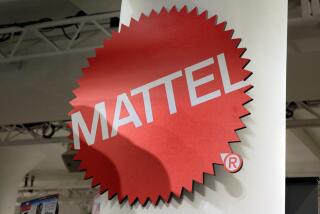Hasbro Rejects Mattel’s $5.2-Billion Takeover Bid
Mattel Inc. offered to buy Hasbro Inc. for $5.2 billion, which would combine the world’s two largest toy companies.
Pawtucket, R.I.-based Hasbro rejected the offer because it said antitrust concerns make the chance of approval “extremely low.”
The combination of industry leader Mattel, known for Barbie and Cabbage Patch Kids, and No. 2 Hasbro, maker of Playskool, Parker Brothers and Milton Bradley toys, would have created a company with about $6 billion in annual sales and about 40% of the U.S. toy market, dwarfing its competitors.
“This one will definitely ring alarm bells with the FTC,” said Garret Rasmussen, an antitrust lawyer at Patton, Boggs & Blow in Washington.
Shares in Hasbro jumped $16.125, or 31%, to $46.75 after the announcement. Earlier, the shares closed down .125 at $30.625 on American Stock Exchange trading. Shares in Los Angeles-based Mattel rose .125 to $32.
Under its offer to Hasbro, detailed in a letter, Mattel said Hasbro shareholders would receive 1.67 Mattel shares for each outstanding share. The offer values each Hasbro share at $53.44, based on Mattel’s closing stock price Wednesday.
“Our hope would be that the merger does occur, whether it’s at this price or a higher price,” said Franklin L. Morton, director of research at Ariel Capital Management Inc. in Chicago, which owns 1.7 million Hasbro shares.
Mattel, which had sales of $3.2 billion last year, makes Fisher Price, Hot Wheels and Disney toys, among others. Hasbro, with sales of $2.7 billion, includes the Kenner, Tonka, Nerf and G.I. Joe lines.
Mattel insists it sees no antitrust problems. It sent the letter to make the offer public in an effort to get Hasbro’s shareholders to rally to convince the board to change its mind.
“We are satisfied that any potential antitrust issues can be resolved without affecting the significant benefits that will be realized by the combined entity,” John Amerman, Mattel chairman and chief executive, wrote in the letter to Hasbro Chairman Alan Hassenfeld.
Mattel even said it would pay Hasbro $100 million if the merger failed to be consummated.
Hasbro said it spurned the offer after a lengthy review by its two firms of antitrust advisors.
“Because of the very low probability of consummation, the economic terms of the proposal were more than offset by the potential harm to Hasbro and its shareholders resulting from a protracted antitrust regulatory progress,” Hasbro said.
Antitrust concerns will be a stumbling block, even though the toy market is fractured and many of Mattel’s and Hasbro’s product lines don’t overlap.
“The question would be whether there are enough other players in the market that if they tried to raise prices, could other competitors step in,” said Steven Sunshine, former top merger official at the Justice Department’s antitrust division.
Antitrust experts said regulators would probably also look for problems in narrow product categories--such as the competitive effect of combining Fisher Price with Hasbro’s Playskool line of toys for preschool children, or the combination of Mattel’s Hot Wheels toy cars with Hasbro’s Tonka trucks.
If regulators found serious concerns regarding those type of issues, they could demand a spinoff of some lines or throw a wrench into the entire purchase.
If they found very few overlapping categories, however, they could give the go-ahead.
Mattel, for instance, faced no real antitrust hurdles during the FTC’s 1993 review of its $1.24-billion purchase of Fisher Price because there was little or no product line overlap.
Mattel said a combination of the two companies would link complementary product lines, make its international operations stronger and would increase efficiencies in manufacturing and marketing globally.
“I’m hoping that shareholders will communicate to their board a strong desire for our proposal,” Amerman said in a conference call.
Mattel said it expects combining the two companies could achieve a minimum savings of $100 million in the first year and would add to earnings.
“This is incredibly attractive to Hasbro shareholders,” said Gary Jacobson, an analyst at BT Securities.
For Mattel, it would continue its moves to bulk up its company through big acquisitions.
Mattel said discussions about combining the two companies began in April.
More to Read
Inside the business of entertainment
The Wide Shot brings you news, analysis and insights on everything from streaming wars to production — and what it all means for the future.
You may occasionally receive promotional content from the Los Angeles Times.










